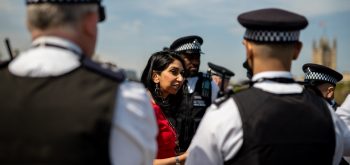Plans to increase the presence of police officers in schools could help feed ‘the school-to-prison pipeline’, according to a recent report. The No Police in Schools initiative, in partnership with Kids of Colour and the Northern Police Monitoring Project (NPMP), recently published a study in response to plans to put at least 20 additional police in schools (SBPOs) in Manchester for the 2020/2021 academic year.
School-based police officers were introduced by New Labour in 2002 as part of the government’s Safer Schools programme which was conceived as part of it ‘tough on crime’ agenda. You can read secondary school teacher Vik Chechi-Ribeiro in the Guardian on why the police have no place in schools.
Almost nine in 10 respondents out of 554 people surveyed were negative about the prospect of a regular police presence in schools (88%). Many were worried that the introduction of SBPOs into schools with a higher proportion of working-class students and young people of colour could ‘exacerbate existing inequalities’. One respondent said: ‘We know that institutional racism is an issue in the police, and we should not further introduce this to our schools.’
In June this year the the Greater Manchester Combined Authority published its ‘Serious Violence Action Plan’ promising an increase in SBPOs. It called a police presence ‘a vehicle for building positive relationships between young people and the police’. It read: ‘Schools are often the first to identify changes in a young person’s behaviour or life circumstances and having a police officer on site would help those schools develop an appropriate package of support for that young individual… . We believe the best way for this to be done is by being a permanent presence in the school where they can engage and support the school and the development of our young people.’
Many respondents were concerned about how the inititiative could feed the ‘school-to-prison pipeline’. One youth worker said that the introduction of additional SBPOs ‘created the idea for young people that they were already viewed as potentially criminal and needed policing as a result’. Vik Chechi-Riberio from the NEU Black Members Organising Forum said students needed to be given ‘support not policing’ during the return to schools following the first national lockdown. One young respondent claimed the use of SBPOs would make schools ‘more of a surveillance state’ than an educational establishment.
Remi Joseph-Salisbury, a member of the NPMP steering group, said that since young people of colour were ‘more likely to be subject to police attention’, it was highly likely that would be more harshly affected by police in schools. There was concern that a police presence would stigmatise schools with almost three quarters of parents and guardians (72%) saying they would have concerns about sending their child to a school with a SBPO.
Young people reported experiencing inappropriate police conduct in schools, including the use of offensive language, sexist victim blaming, the sexualisation of young people, and the communication of misinformation about sex education. For example, one student described how ‘when [they were] a victim of a crime, [the police] told [them they] should have avoided being a victim’. One parent described their daughter being subjected to ‘vile and abhorrent abuse’ and that they felt it was necessary to remove her from school at age 14 ‘to protect from institutional racism’.






